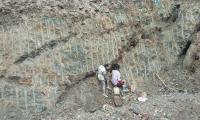Mining in Myanmar needs rethinking

The Myanmar Centre for Responsible Business (MCRB) together with the Danish Institute for Human Rights (DIHR) just published a sector-wide impact assessment (SWIA) on the mining sector (opens new tab), with field research focussed on tin, gold and limestone mining in eight states and regions.
The field research, as well as an extensive review of current laws and initiatives, identified five main challenges for achieving responsible mining in Myanmar:
- Policies, laws and regulations relevant to mining activities lack clarity and inhibit responsible investment
- The capacity of government and business actors to monitor and address environmental, social and human rights impacts of mining is limited
- The environmental, social and human rights costs of mining are externalised on local communities
- Governance of mining in conflict-affected areas is highly problematic
- Extensive informality in the mining sector needs to be addressed
Speaking today at the launch of the assessment in Yangon, Vicky Bowman, Director of MCRB said:
“The entire approach to mining in Myanmar needs a rethink. Our field team observed so many negative impacts when undertaking the research for this assessment. Most of the harms were felt by workers – including women and children - and born by the environment. A fresh start, a clear policy vision, and simple laws to underpin it, are essential if mining is ever to contribute to sustainable development in Myanmar.”
Addresses multiple levels of analysis: project level impacts, cumulative impacts and sectoral impacts.
Aims to shape policy, law and projects.
Can form the basis for future project-level environmental, social and/or human rights impact assessments.
Involves more extensive field research.
Takes a broad view of human rights impacts.
Serves as a public resource.
Claus Teilmann Petersen, the Director for Human Rights and Development at DIHR, added:
“It is welcome that the Myanmar government is seeking to formalise artisanal and subsistence mining rather than outlaw it. Although artisanal and subsistence mining has significant negative impacts on human rights and the environment, it also benefits thousands of poor people. Formalising artisanal mining is a difficult task, but if it can improve human rights, we need to consider it. One lesson for putting together an effective artisanal and subsistence mining management strategy is that governments need to consult with all stakeholders, including the subsistence miners themselves.”
The Mining SWIA is based on both desk-based and field research in Mandalay, Sagaing, Bago and Tanintharyi Regions, and Shan, Kayah, Kachin and Kayin States, concerning gold, tin and limestone mining which took place in 2016. It includes in-depth analysis of existing Myanmar policy and legal frameworks relevant to the mining sector, including frameworks on investment, environment and safety, as well as the historical, political and economic context.
Economic, governance, and environment social and human rights impacts are examined at sectoral level. Local project-level and cumulative impacts are examined concerning communities, land, labour and safety, women and children, conflict and security, and environmental and ecosystems services.
The SWIA makes recommendations to government, companies, ethnic armed organisations, civil society organisations and other governments.
This is the fourth SWIA by the Myanmar Centre for Responsible Business, the Danish Institute for Human Rights and the Institute for Human Rights and Business in Myanmar.
